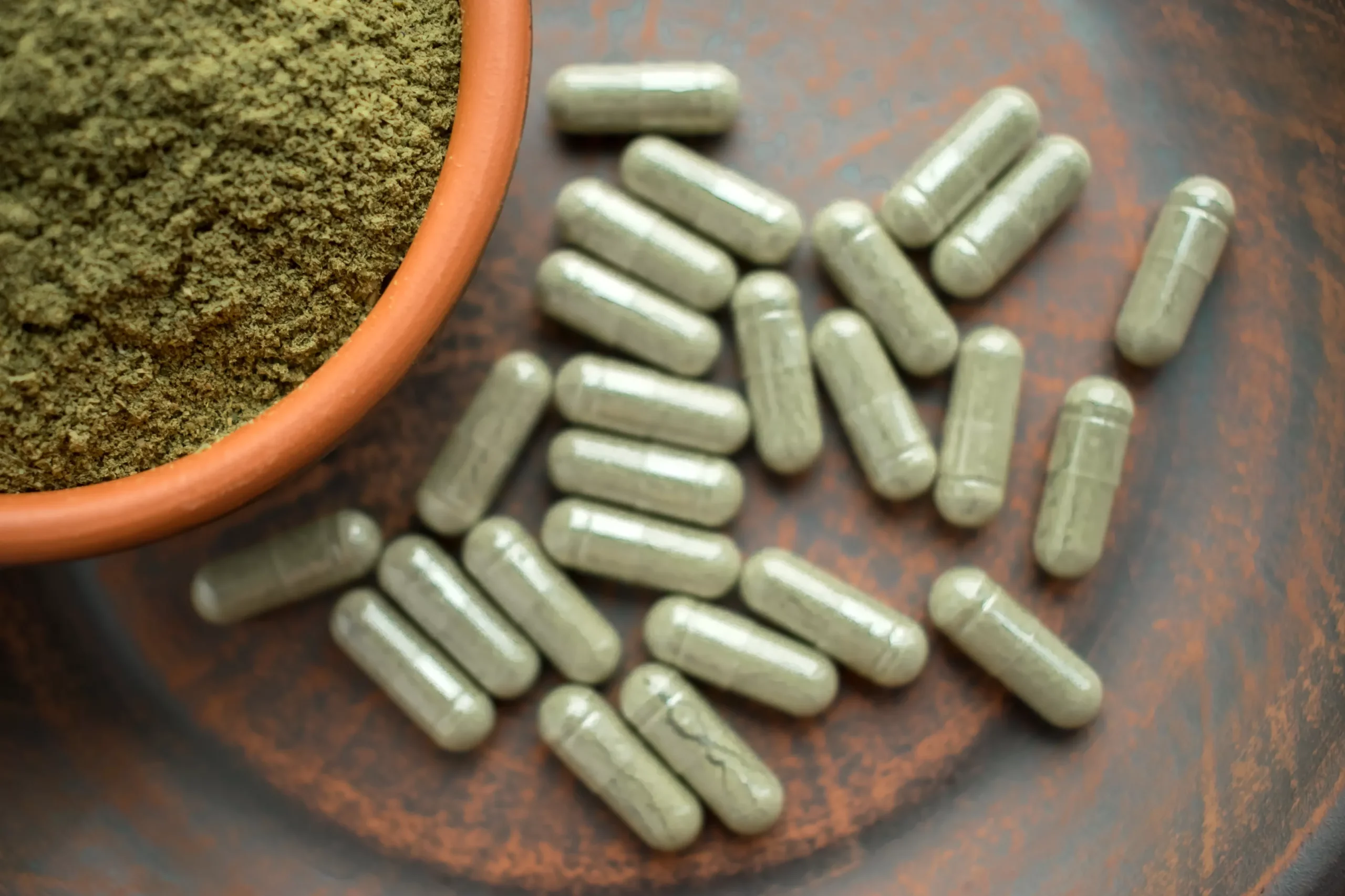[[{“value”:”Bali Red, Green Maeng Da, White Thai — Asian-inspired cocktails, or potent opioid substitutes?
These names represent strains of Mitragyna speciosa, commonly known as Kratom, that are likely recognizable to any regular patron of mainstream smoke shops.
Illegal in six U.S. states, products made from this Southeast Asian plant often adorn smoke shop and convenience store shelves in Texas and beyond, and have earned it the nickname “gas station heroin.”
With a looming statewide THC ban ready for Abbott’s pen stroke, local experts say it and other unregulated substances could serve as substitutes for some Lone Star THC consumers. But to what extent?
“Kratom operates like an opioid — that’s no bueno. It’s clear to me it can be really helpful to some people, but there are no regulations. It’s another failure of the state,” said Susan Hays, an attorney and advocate focused on cannabis law.
Involved with the drafting and passage of 2019’s House Bill 1325, Hays argues the state of Texas has been too lazy to enforce hemp regulation outlined in the bill over the last six years, leading to a prolific amount of high-dose products the state is now reprimanding in legislation and heated press conferences.
“Visualize it as a marketplace — a very messy marketplace, and people need a place to go. The state has been asleep at the wheel.”
While Hays notes it’s possible more consumers could turn to unregulated products like kratom and mushroom strains, the legal veteran predicts that the THC ban will mainly boost cartel trafficking.
But what about other legal (for now) products?
Chris Deal, owner of National Drug Screening, a drug and alcohol screening company with locations in McKinney and Dallas, says both legal and illegal eventualities are possible.
“Users could migrate to alternatives like kratom, mushroom gummies, or herbal supplements like valerian root or ashwagandha. I think both will happen,” said Deal.
“Those who are less risk-averse will seek it [THC] from the black market or other states, and increased arrests will put a higher burden on the court system.”
But these alternatives also lack regulation, and have already been targets of drafted legislation in the state.
Senate Bill 1868 proposes adding kratom to the Texas Controlled Substances Act, increasing civil penalties for possession and use, and creating criminal offenses related to the drug.
Sponsored by Republican Charles Perry and Dallas Democrat Royce West, the bill’s passage could mark the next wave of substance regulation in Texas. In April, it was engrossed and sent to the House Public Health Committee.
If passed by the House, Texas would join Alabama, Arkansas, Indiana, Rhode Island, Vermont and Wisconsin in holding an established ban on Mitragynine and 7-hydroxymitragynine (often sold under the Opia brand name), an active compound found in kratom that’s known for its analgesic properties.
When it comes to psychoactive, recreational mushrooms, a similar story stands.
Atop one set of cube shelves in Mushroom Street Farm’s artisanally curated Deep Ellum outpost sit sculptures, trinkets, and figures of Amanita muscaria, the iconic and whimsical toadstool.
Memorialized in pop culture staples like Alice in Wonderland, Super Mario Bros. and garden ornaments available at niche and big-box stores alike, the famous red and white psychoactive mushroom is known for its magic and mystery in folklore.
“Smoke shops in Texas can still sell Amanita muscaria because it’s not classified as a controlled substance at the state or federal level,” Andrea Gwartney, co-founder of the Arlington-based business. “Even though it’s legal, it’s not considered safe for human consumption and hasn’t been approved by the FDA.”
At the business’s two shops, shoppers won’t find any actual Amanita muscaria. Instead, Gwartney says her business ethos focuses more on the functional and health benefits of mushrooms.
The brand also hosts regular educational workshops and cooking classes, and those interested in the benefits of mushrooms can explore products made from varieties like Lion’s Mane, Chaga, Cordyceps, Maitake and Reishi.
While a kratom bill remains up in the air, there’s no telling when the state could come for psychotropic toadstool treats.
Until then, advocates remain critical of the state’s increasingly conservative legislature.
“You can’t say this is a free state. We are going to have a trainwreck of other people who cannot get what they want, and they will turn to the black market,” said Hays. “It’s absolutely not reactionary to say that this will give the cartels a bigger market.”
“}]] Customers likely to be shut out from intoxicating hemp will have to find new avenues, possibly leading to illegal options. Read More


